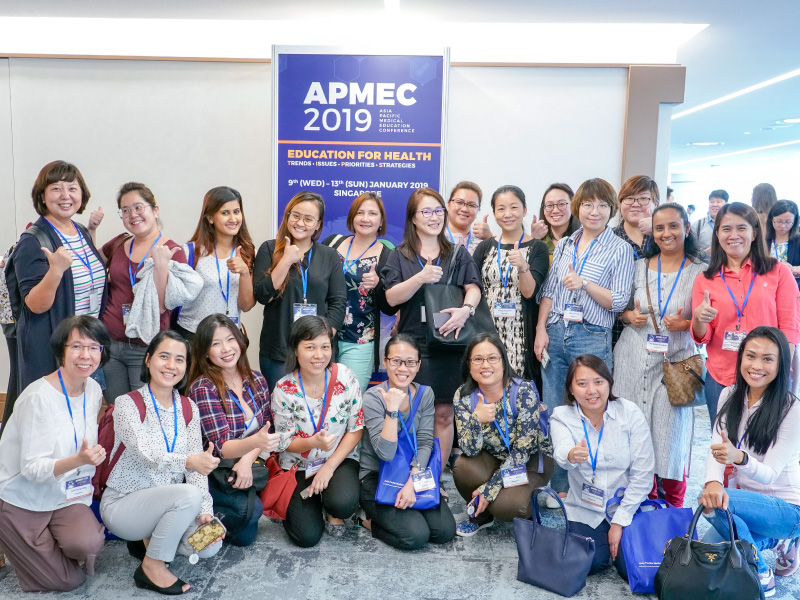Asia Pacific Medical Education Conference (APMEC) 2019
By Professor Matthew Gwee,
Centre for Medical Education
Soon after heralding in 2019, the Centre for Medical Education (CenMED), NUS Yong Loo Lin School of Medicine, hosted APMEC 2019 (now in its 16th year) after months of dedicated preparation for the event. More than 1,420 delegates from 39 countries registered for the conference.
Why is there so much enthusiasm for the APMEC series?
The primary aim of APMEC is to provide a conducive forum for a community of educational scholars from around the globe to share and learn together, especially from the insightful and authoritative reviews of current Trends, Issues, Priorities, Strategies (TIPS) now strongly advocated for the two interdependent sub-systems (education and practice) within the overall healthcare delivery system. Hopefully, the reviews will enhance and help many teachers in educating, training and transforming students to
become 21st century healthcare practitioners. In this context, the organisers wish to express their deep appreciation and gratitude to all presenters at the conference – especially to the invited speakers, who so readily shared their expertise, wisdom and rich experience with everyone. Not only did the speakers stimulate the educational curiosity of delegates, they also set the tone for APMEC 2019!
CenMED also takes pride in contributing to the aim of establishing the NUS Yong Loo Lin School of Medicine (NUS Medicine) as a Centre of Excellence for Medical Education. CenMED is now well-poised to undertake this role, as the leadership has developed and established strong bonds and global networks with many leaders in education and healthcare and with many leading institutions and organisations around the globe. APMEC 2019 provides clear evidence of such global connections!

Delegates working on a student collaborative project pose for a group photo.
As always, pre-conference workshops (on 9th and 10th January) preceded the main conference. They are similar to faculty development programmes conducted in many institutions. Delegates who attended the workshops benefited educationally through skills enhancement and went away better prepared as teachers in the 21st century.
Moving away from tradition, the opening ceremony for APMEC 2019 was held on the evening of 10th January at the University Cultural Centre, followed by a small reception for invited guests. Professor Chong Yap Seng, Dean of NUS Medicine was the Guest of Honour.
The main conference continued over the next two days (11th and 12th January) with much food for thought for delegates to chew on. Many delegates also renewed friendships established in the past and opportunities abounded for them to make new
friends. The closing ceremony was held at the end of the formal sessions on 12th January. Some workshops were scheduled as post-conference workshops on 13th January, due to overwhelming constraints to accommodate all workshop offerings.
A total 270 abstracts were presented during APMEC 2019 and the winner and runner-up for the Free Communication Presentation were Nigel Tan Choon Kiat from NTU Lee Kong Chian School of Medicine and Cheung-Ting Hsiao from Chang Gung Memorial Hospital, Taiwan respectively (see table below).
Last, but certainly not least, the leadership in CenMED wishes to thank NUS Medicine staff led by Ms Lee Su Mei, Senior Associate Director, CenMED for their efficiency and ever gracious manner in extending a warm welcome to the delegates. Let’s all look forward to the 17th APMEC in 2020!
| Award | Name | Abstract Title | Institution, Country |
| Winner | Nigel Tan Choon Kiat | Standard-Setting in Undergraduate Medical Education: Comparing Three Methods for Summative MCQ Tests | Lee Kong Chian School of Medicine, Nanyang Technological University, Singapore |
| Runner-up | Cheung-Ting Hsiao | The Development of the Emergency Medicine Milestones in Taiwan: A Validation Study | Department of Emergency Medicine, Centre for Faculty Development, Chang Gung Memorial Hospital, Taiwan APMEC 2019 participants |
